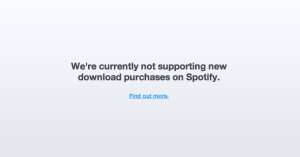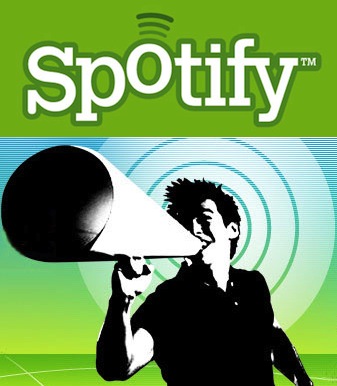Spotify has made a mark in the music business with its hugely popular music streaming service, now with 20 million subscribers, 5 million of which pay monthly for it. But the company had also hedged its bets by also offering downloaded music, competing against the likes of Apple’s iTunes and Amazon in the process. All that now is changing: the company has halted music downloads to all customers, unless they have gift cards with a specific download link, in a push to “simplify” the service and “pave the way” for newer features like web-based browsing.
The change was first reported by Pocket Lint, and judging from a scan on Twitter there were people noting the change in at least two markets, the UK and Sweden. In Sweden, at least one person noticed the change before the new year (and another before Christmas), while in the UK it looks like it just started to take effect in the last day. A look on Spotify’s site indicates that download music has ceased in other European markets, too: including Norway, The Netherlands and France — essentially all the markets where it’s been offering downloads. It seems the U.S. didn’t have the downloading option available to begin with.
Spotify has not given an explanation for the change, and it has not responded yet to our questions.
Update: Spotify has responded to confirm the story, and notes the change was made to “simplify” the service. It’s not ruling out re-instating the download feature, developed in-house, again in the future.
“We recently updated Spotify to further simplify the service and pave the way for new features announced at the end of last year. In-app purchases aren’t part of this update but we’re not ruling out their return. Credits/gift cards already purchased are still redeemable.”
It does not appear that all of this affects offline listening for premium subscribers, and those who have downloaded tracks keep those, too. I have reached out to Spotify to double confirm these two details.
In the meantime, the following notice pops up when you try to download a track:

The further details also do not provide any explanation.
In general, the amount of public reaction seems fairly small — a sign perhaps that the service was not used that much compared to Spotify’s streaming option.
We have also now heard from a source close to the situation confirming that observation: “very, very few downloads,” we were told. Furthermore, the source claimed the credit system that Spotify had been operating — these were download bundles of 10, 15, 40 or 100 tracks that you could pre-purchase to bring down the price of individual downloads — didn’t work to encourage more purchases: “a turd,” in the source’s own words.
The downloads used to be powered by 7Digital, until Spotify in 2011 switched to an in-house service to better “manage the entire process“.
It’s not a surprise that Spotify would instead choose to focus resources and energy on its streaming service, which continues to disrupt the overall music sales and download business. Some of that disruption is perhaps too close to the bone, though.
Metallica announced a landmark Spotify streaming agreement in December, with a very loved-up session between Spotify investor Sean Parker, former arch-nemesis Metallica’s Lars Ulrich, and Spotify CEO Daniel Ek to commemorate the deal. But since then, sales of Metallica’s music have been down — way down.
According to Billboard:
“Billboard.biz looked at Nielsen SoundScan data for Metallica’s studio albums for four-week periods leading up to Christmas from 2008 to 2012. Based on the catalog’s performance in previous years, album sales were 15% below expectations the week the titles were added to Spotify and 35% below expectations the following week. Sales were in line with expectations the week before the titles were added to Spotify. Another way to look at the drop in Metallica’s catalog sales is to track the rise in sales leading up to Christmas. Metallica sales the week before Christmas have been from 48.8% to 71.1% higher than the average of the preceding three weeks (64.8% in 2008; 71.1% in 2009; 48.8% in 2010; and 53.6% in 2011). But those same albums increased only 28.5% in 2012.”
There has been other evidence pointing to the fact that streaming services have been cannibalizing music downloads and physical sales.
In Sweden, music sales were up by 30.1% in the first half of 2012 to SEK 446 million ($63 million). Within that, digital music was 63.5% of all sales, with physical down by 2.2%, streaming revenues up by 79.4% and downloads falling by 14%. Streaming revenues in Sweden already outpace download revenues nearly tenfold ($40 million versus $4.4 million in the first six months of the year.)
